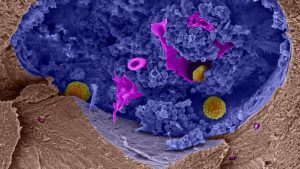Kelly Servick in Science:
 In multiple sclerosis (MS), a disease that strips away the sheaths that insulate nerve cells, the body’s immune cells come to see the nervous system as an enemy. Some drugs try to slow the disease by keeping immune cells in check, or by keeping them away from the brain. But for decades, some researchers have been exploring an alternative: wiping out those immune cells and starting over. The approach, called hematopoietic stem cell transplantation (HSCT), has long been part of certain cancer treatments. A round of chemotherapy knocks out the immune system and an infusion of stem cells—either from a patient’s own blood or, in some cases, that of a donor—rebuilds it. The procedure is already in use for MS and other autoimmune diseases at several clinical centers around the world, but it has serious risks and is far from routine. Now, new results from a randomized clinical trial suggest it can be more effective than some currently approved MS drugs. “A side-by-side comparison of this magnitude had never been done,” says Paolo Muraro, a neurologist at Imperial College London who has also studied HSCT for MS. “It illustrates really the power of this treatment—the level of efficacy—in a way that’s very eloquent.”
In multiple sclerosis (MS), a disease that strips away the sheaths that insulate nerve cells, the body’s immune cells come to see the nervous system as an enemy. Some drugs try to slow the disease by keeping immune cells in check, or by keeping them away from the brain. But for decades, some researchers have been exploring an alternative: wiping out those immune cells and starting over. The approach, called hematopoietic stem cell transplantation (HSCT), has long been part of certain cancer treatments. A round of chemotherapy knocks out the immune system and an infusion of stem cells—either from a patient’s own blood or, in some cases, that of a donor—rebuilds it. The procedure is already in use for MS and other autoimmune diseases at several clinical centers around the world, but it has serious risks and is far from routine. Now, new results from a randomized clinical trial suggest it can be more effective than some currently approved MS drugs. “A side-by-side comparison of this magnitude had never been done,” says Paolo Muraro, a neurologist at Imperial College London who has also studied HSCT for MS. “It illustrates really the power of this treatment—the level of efficacy—in a way that’s very eloquent.”
Nearly 30 years ago, when hematologist Richard Burt saw how HSCT worked in patients with leukemia and lymphoma, he was struck by a curious effect: After those patients rebuilt their immune systems, their childhood vaccines no longer protected them, recalls Burt, now at Northwestern University’s Feinberg School of Medicine in Evanston, Illinois. Without a new vaccination, the new immune cells wouldn’t recognize viruses such as measles and mumps and launch a prompt counterattack. That suggested that in the case of an autoimmune disease, reseeding the immune system might help the body “forget” that its own cells were the enemy. Burt and others have since used HSCT for a variety of autoimmune diseases, including rheumatoid arthritis and lupus. In the past few years, several teams have reported encouraging results in MS. But only one study—which evaluated just 17 patients—directly compared HSCT to other available drug treatments.
More here.
